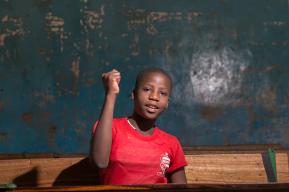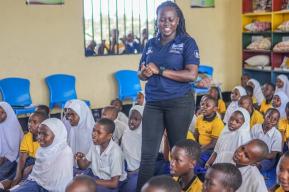On the occasion of the International Day against violence and bullying at school including cyberbullying, UNESCO highlights the strong connections between school violence and mental health, and calls for urgent action to foster safe learning environments and end all forms of violence in and around school.
Bullying, harassment and other forms of school violence have serious impacts on learners’ mental health. In the Philippines, over 40% of learners aged 13-17 report experiencing bullying at school in a year and only 29% report that their parents or caregivers had understood their worries over a month. Poor mental health is concerningly high in the country, relative to the region. Providing mental health and psychosocial support to learners (MHPSS) is a key priority and a commitment to strengthening education systems and services.
Alongside the Government of the Philippines, UNESCO is contributing capacity-building tools and approaches to safeguard learners’ education and mental health by addressing root causes such as school violence. This work feeds into UNESCO’s commitment to health and education, and in turn to the creation of safe, welcoming and enabling learning environments for teachers, learners and advocates like Rjhay.
Meet Rjhay
“Providing mental and psychosocial support to learners is an effort in itself to reduce or even remove violence,” says Rjhay who is all too familiar with violence at school, having faced bullying throughout her education along with many of her LGBTIQ+ peers. While she was assigned male at birth, she identifies as a woman. “Confidence, productivity, self-worth, and even our own lives are at risk every time bullying takes place, especially in a place we often refer to as our ‘second home’”, says Rjhay referring to school.
Rjhay’s experiences have shaped her into an advocate raising awareness around the impact of bullying and importance of ending school violence. She actively works with schools and government administrations to implement and improve bullying-prevention strategies and access to mental health support for learners who face bullying.
Together with other youth, Rjhay participated in a consultation workshop hosted by the Philippines Department of Education, UNESCO and UNICEF about a new assessment tool developed for MHPSS in the education sector. Participation by young persons like Rjhay, alongside education and mental health specialists, helped to ensure that the formulated recommendations improve on existing MHPSS education programmes and policies in the Philippines.
Influencing change with her story
“Bullying and violence exist in schools on the basis of gender”, says Rjhay. “Having to prove yourself every day, striving to earn the minimum respect, and working to overturn the narrative and stereotypes is a burden. And it affects one’s mental health!”
Informed and powered by her lived experiences, Rjhay champions a redesign of current MHPSS programmes to be more inclusive of gender and race, among other factors. “Discrimination, on the basis of gender, intellectual capacity, religion, race, colour, social status, cultural belief, self-expression, and more, is perhaps one of the major causes of violence and mental abuse in schools — and this needs to end.”
“Discrimination has no place in school”, says Rjhay. Alongside the need for anti-bullying programmes and a zero-tolerance approach, she believes creating a caring culture is a necessity, paired with:
- Offering sensitivity trainings for teachers and school staff
- Integrating mental health into the curriculum from kindergarten through to high school
- Addressing the impact of technology and social media on youth’s mental health
- Raising awareness on existing support and free helplines, most often unknown to those in need.

You are not alone: A collective commitment
For Rjhay, change can only be achieved collectively, at every level and with combined efforts and commitment from all who care. “Teachers and parents should be partners in nurturing a child, in the home and in school”, she says. “They should mutually agree that no violence or mental harm should take place under their watch.”
Her message to young people: “You are not alone. Many people, including me, are your allies for mental well-being, a peaceful environment and safe spaces. “Violence is unacceptable and the whole ecosystem, including the law, will listen to and support you.”
“It takes courage to speak out and to ask for help. I am certain you have that power within you.”
Developed by UNESCO together with UNICEF, the tool aims to support governments’ efforts on health and education, and inform on the education sector’s MHPSS policy and programme strengths, weaknesses, gaps, and opportunities, for more effective action. The draft tool is being revised based on the recommendations from the Philippines consultation and will be further piloted in Fiji in the first quarter of 2024. UNESCO and its partners are also planning to conduct action research on MHPSS to strengthen teacher competencies and protect mental health and psychosocial wellbeing in schools.
Learn more:
- UNESCO’s work on health and education in Asia and the Pacific (Regional office in Bangkok)
- International Day against violence and bullying at school including cyberbullying
- UNESCO’s work on safe learning environments








